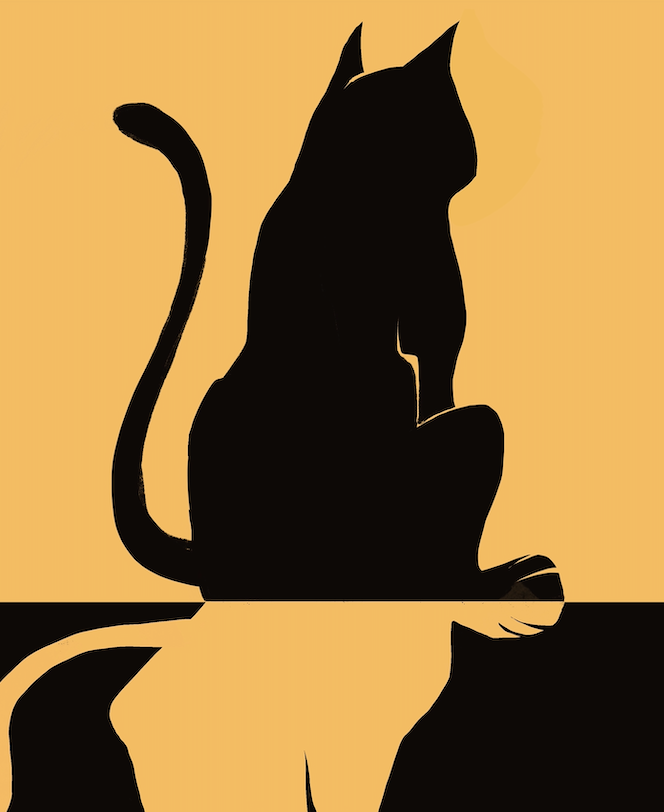The Black Cat: The Black Cat isn’t going anywhere, though I am

This past semester, I had the opportunity to interview the most amazing black entrepreneurs; I was able to travel deeper into the community of South Los Angeles and meet people striving to achieve their dreams. I interviewed my hairdresser who lives in View Park and spoke with two entrepreneurs who are about to open up the first black brewery in Inglewood. I talked to the community members who opened up the first black-owned social club in Los Angeles and ate soul food at a restaurant with a black female head chef. It’s safe to say that this semester, I became more in touch with my own culture, and the possibilities of what we can do.
And so now, to wrap it all up, I interview my last black entrepreneur for the semester.
I sit with her at a coffee shop in USC Village. She is nervous, with a self-proclaimed (organic light roast) coffee addiction and is about to graduate from USC with a degree in what is basically a fancy word for storytelling. After just learning how to properly connect to USC’s Wi-Fi, she says she has no idea what is going to happen after graduation. Life is unpredictable and scary, but it’s part of the journey. And, as a young writer, she is aware of the possibilities life has to offer. It is not the lack of opportunities that scares her, but the abundance of them.
It’s me. I’m the young writer.
“I am just going with the flow,” I said to myself in the interview. “I will [probably] go home for the summer, regroup and see what opportunities I can find in the fall.”
The decision to go home, to work at the local newspaper while reaping the benefits of home-cooked meals and the comfort of sleeping with more than two pillows on a bed, was a personal one.
“I just want to go home,” I said. “Working with my local newspaper will be a good training ground for me to practice investigation, reporting skills and getting closer with my own community. There are some good stories to cover back home.”
And as this year looks to be a gap year before graduate school, there are many cities to visit, many countries to travel to and many things to try, in order to find out which path is the best fit. The digital field is unstable but rapidly expanding; journalism has never been more essential to public service and the voices of those long ignored by the world have never been louder, longing for someone to hear them and tell their stories.
“I never considered myself a journalist, but rather, someone who simply did journalism,” I said. “But as I got older, I realized journalism has many different genres within [it], and there is a need for people to cover national policies, just as there is a need for someone to cover, perhaps, the cultural erasure and gentrification happening to various communities, not only in this country but also abroad.”
But as the world of journalism moves more into the digital sphere, there is an element of branding that must accompany it. Now, writers can find gigs on Twitter and models can make it big on Instagram. Having an aesthetically pleasing website can capture the eyes of interested publicists and meeting the supply and demand of the written word in today’s age, often cannot wait for an editor’s discretion.
“I’m trying to find ways to maximize myself as a writer, while also having a brand that can accompany that,” I said. “I want to still have internships … I want to still do everything the traditional way, but I also want to make sure that the foundation of my writing career is rooted in the possibilities that social media has to offer. I don’t want to box myself in as just one thing. If I can do it all, then let me do it all.”
Writers from previous generations often must go back to create digital footprints for themselves after having long and fabulous careers. But there lies an opportunity for newer generations to build social presences in tandem with their careers, so that they can not only be journalists, but also sell clothes on their Instagram accounts.
“It’s a balancing act,” I said. “And this summer I will be figuring out how to, I guess, do just that … I don’t [know] what will happen in the fall, and I’m looking at places to apply, looking at places to move to. But whatever happens, I just want to make sure that I keep going. That I keep trying to [find] footing in this rapidly changing world.”
Now, as the final weeks of college approach, there is only anxiety, fear and excitement for what is to come. There is no way to focus on what the future holds. There is only the present and the ways in which those moments must now come together and prove themselves.
So this is hardly the end for “The Black Cat.” This premise will continue as a newsletter and will also begin covering the intersection of black culture and politics. This is so that, whether an editor picks up a freelance pitch or not, the culture will be covered and the people will still have a voice.
“Please subscribe to my newsletter,” I said.
Theblackcat.substack.com.
Dominic-Madori Davis is a senior writing about black-owned businesses in Los Angeles. She is also the chief copy editor of the Daily Trojan. Her column, “The Black Cat,” ran every other Thursday.

